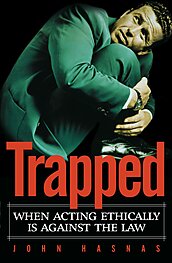Since Enron’s collapse in 2002, the federal government has stepped up its campaign against white-collar crime. In doing so, contemporary federal criminal law has created a “Catch-22,” in which businesspeople are forced to act either unethically or illegally.
In Trapped: When Acting Ethically is Against the Law, Cato Institute senior fellow and Georgetown University business professor John Hasnas examines the ethical dilemmas raised by over-criminalization. “Because there is an increasing divergence between the demands of the law and the demands of ethics,” Hasnas explains, “current federal criminal law incentivizes and in some cases mandates unethical behavior by businesspeople.”
In creating white-collar criminal law, the federal government has eviscerated the liberal safeguards of the traditional criminal law to permit conviction for merely negligent or innocent actions and to circumvent the presumption of innocence, the 5th Amendment privilege against self-incrimination, and the attorney-client privilege.
Thus, federal criminal law creates serious problems for businesses that wish to respect their employees. According to Hasnas: “It gives corporations strong incentives to invade employees’ privacy, deny them the presumption of innocence, and breach promises of confidentiality.”
Hasnas concludes that the solution to the problem of white collar crime does not rest with more vigorous federal enforcement efforts: “With regard to the offenses that can adequately be handled by civil liability, the proper solution may be abstaining from any efforts at criminal enforcement at all.”
